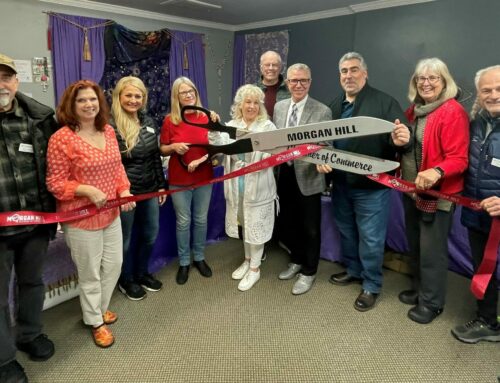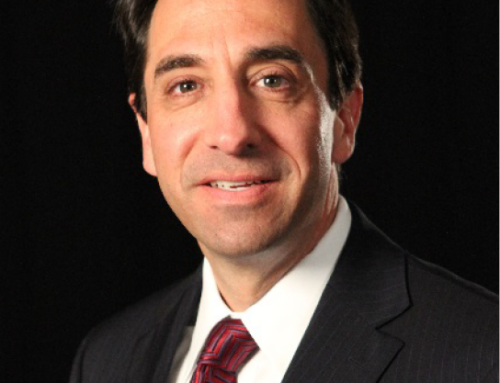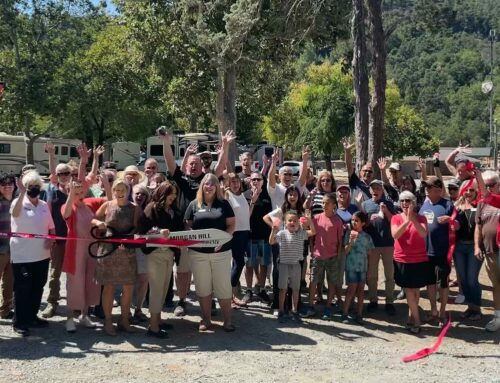Service dogs help those in need recapture their lives
Published in the December 10-23, 2014 issue of Morgan Hill Life
By Marty Cheek

David and his dog Shadow are now best friends. Instead of breeding dogs specially for the program, Operation Freedom Paws finds dogs through canine rescue organizations who are looking for a home. Then the person and the dog train together. Photo courtesy Operation Freedom Paws
Operation Freedom Paws started when Mary Cortani received a life-changing phone call during the holiday season of 2009. The Gilroy resident had recently started a dog training program called Canine Coach Plus when a U.S. Marine, an Iraq War veteran who left the military after getting injured in 2003, contacted her. He told Cortani that he needed a mental health service dog to help him with his post traumatic stress syndrome. The man had been on the waiting list for a service dog organization and was getting nowhere. Other dog training organizations would charge him from $5,000 to $35,000 for their service dog programs.
“He struggled to get benefits,” Cortani said. “There was desperation in his voice. I realized that if he didn’t get help he wasn’t going to be around.”
The two talked on a daily basis and the dog trainer found a service dog for the former Marine. The two started on a training program in January 2010. From that point, word got around about the method that Cortani, a nine-year U.S. Army veteran, had in helping veterans deal with their post-military lives through the help of a canine companion healer. Her program helped 28 people by the end of its first year. Individuals go through the program in an average of 48 weeks. Each client’s family gets involved in the program to help in the canine companionship therapy.
“A friend said, you really need to start a nonprofit. You’re really on to something here. You’re doing this different from everybody else,” she recalls. “So we filed the paperwork in May of 2011 for our filing for incorporation as a nonprofit and we received our nonprofit status in September of that year, which was pretty straight forward and quick, which is unheard of. The universe intervened.”
Operation Freedom Paws is extremely different from traditional service dog programs. Instead of breeding dogs specially for the program, the organization finds dogs through canine rescue organizations who are looking for a home. Traditional programs usually train the dogs before they meet their human companion and then the two go through a four- to six-week boot camp where they are supposed to learn a deluge of commands. Operation Freedom Paws instead trains the dog and client as a partnership. It’s slogan is “Four paws, two feet, one team.”
“We’re teaching them to train their own dogs and they’re creating the habits of how to use the commands so they get the benefits right off the bat,” Cortani said. “They’re not being thrown a hundred commands all at them in a short period of time and expected to remember it. They’re done in building blocks so that when they’ve learned one thing successfully, they’re able to retain it and use it on a daily basis.”
The intent of the program is not necessarily the canine’s development, she emphasized.
“We’re training the people. It’s the person who needs the healing,” she said. “Our focus is on the people, and the dog is the tool to help them get out there and live a quality life. You, know, create that new normal that we all live everyday.”
Since it started five years ago, Operation Freedom Paws has helped nearly 180 clients. About 85 percent of these are military veterans, but the nonprofit also helps adults and children with a disability gain their independence through the help of a service dog companion. One child with mental development issues who went through the program eventually became comfortable enough to sleep in his own bed at night by himself.
The program grew so successful so quickly that in 2012 it got an international recognition when cable TV station CNN selected Operation Freedom Paws as one of 10 organizations in its “Heroes” program. Soon after, veterans across America contacted Cortani.
“It increased donations for a short period of time while the attention was there, but it also put the spotlight on us, which is great,” she said. “We’ve been able to work with vets in other parts of the country who needed support, so we did Skype and videos and telephone calls to help them train their service dog. It gives us some credence.”
Among the people who Operation Freedom Paws has helped is U.S. Air Force veteran John A. Clark who comes from Salinas with his dog Sadie for the weekly training. Still a puppy, his canine companion helps him deal with anger issues, anxiety and night terrors.
“She is affected by them and so she will let me know that it’s probably good for me to go,” Clark said. “And even as a pup, she’s already picking up on that. And as she gets older and gets out of her puppiness, she’ll get a lot better at it.”
Clark’s condition use to keep him closed off in his house. He couldn’t deal with large crowds until he went through the Operation Freedom Paws program.
“Since I’ve had her, I’m a season ticket holder at Stanford and we’ve gone to Stanford games and she did great,” he said. “We’ve gone to the Monterey County Fair to get her use to crowds and she did very well.”
Vietnam War U.S. Army veteran Denny McLaughlin of Hollister entered the canine training program in July 2012 with his Great Dane Abbie.
“The first day we came to Operation Freedom Paws, my wife and I sat outside and I said, ‘I don’t think I can do it,’” he recalls. And Mary got us inside with the other dogs and I started to build my confidence. And one night, I realized I could do this by myself.”
McLaughlin has gone through more than 500 hours of classroom time and continues with the program because this is where he and Abbie come for healing.
“When I start to feel not totally right, she won’t leave me alone,” he said. “She’s even been known to nibble on my fingers. I have a lot of non-use of my arm. And in the grocery store she helps me go down the aisle. When I get down to get something from the bottom shelf I can tell her to brace and she’ll lock her shoulders and I can use her to get up.”
Of Cortani’s relationship with the vets going through the training, he said she’s a “blessing” for their lives.
“If we had more people like her, there would be fewer problems across the board in order to help veterans and even other people with disabilities,” McLaughlin said. “She understands the military side of thing. She seems to be as tough as nails, but there’s such a compassionate heart for others that she really cares for. There’s not a soul in here tonight that she doesn’t care about.”
About a year ago, Operation Freedom Paws outgrew its Gilroy facilities. South Valley waste management company Recology had a site of a few acres next to its San Martin Transfer Station that it wasn’t using, and offered the use of the facility for $1 a year for five years. The location is ideal because it features an office building and a large barn where the clients can train with their dogs. Volunteers spent hours clearing rubbish and fixing up the property, and the Canine Education Center opened for business in November. Cortani credits Santa Clara County Supervisor Mike Wasserman for helping cut through much of the red tape to get its permit so quickly.
Besides the training, the site is offering daycare and boarding for pets as an on-going revenue source.
“Every dollar coming in from somebody bringing their dog in for boarding or daycare will go into the program,” Cortani said. “The public deciding to come and use our services is going to help the program. We hire vets, we hire our clients, our mentor trainers, our veterans. It’s the full circle for them. Everybody wants to have value and feel like they’re part of a team and accomplishing something.”








